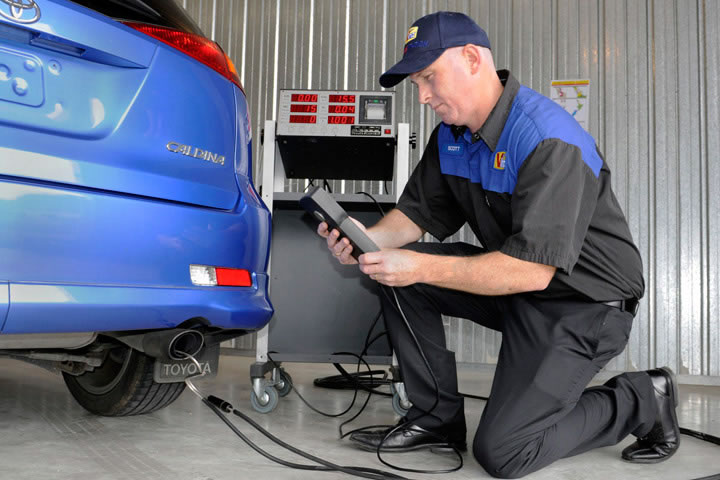California Vehicle Emissions Inspection Laws
California, at the forefront of environmental initiatives, has stringent Vehicle Emissions Inspection Laws in place to ensure cleaner air and reduce the impact of vehicular emissions on the environment. Understanding the key aspects of these laws is crucial for every vehicle owner in the state.
The following article will give you the basics of “smog” laws in California. Below you can find out how smog checks are performed in the state of California, and which vehicles can be exempt from the laws.
Vehicles Subject to Inspection
California mandates emissions testing for various vehicle types to control air pollution effectively. While most vehicles, both new and used, are subject to biennial inspections, certain exemptions exist. Specific categories, such as electric and hybrid vehicles, may have different requirements. It’s essential for vehicle owners to be aware of these distinctions to ensure compliance.
Emissions (smog) inspections are required for most gasoline powered vehicles registered in the state of California, unless exempt.
Vehicles registered in areas subject to the biennial smog certification program are required to undergo testing for every other registration renewal. Vehicles in these areas are exempted for the newest eight registration model years, but are required to pay an annual “smog abatement fee” during those years.
Diesel vehicles model year 1998 and newer or vehicles with a GVWR of 14,000 lbs or less are required to be tested. Gasoline vehicles are exempt if model 1975 or older.
Vehicles exempt from smog testing:
- New vehicles for the newest eight (8) model years (must pay an annual “smog abatement” fee)
- Pre-1976 model year gasoline vehicles
- Pre-1997 model diesel vehicles
- Vehicles registered as “specially constructed” that have received an emissions waiver
- Motorcycles and electric-powered vehicles
Counties with smog inspections
Smog inspections are required in the following counties: Alameda, Butte, Colusa, Contra Costa, Fresno, Glenn, Kern, Kings, Los Angeles, Madera, Marin, Merced, Monterey, Napa, Nevada, Orange, Sacramento, San Benito, San Francisco, San Joaquin, San Luis Obispo, San Mateo, Santa Barbara, Santa Clara, Santa Cruz, Shasta, Solano, Stanislaus, Sutter, Tehama, Tulare, Ventura, Yolo, and Yuba.
The counties of El Dorado, Placer, Riverside, San Bernardino, San Diego, and Sonoma require smog certifications within certain zip codes only.
Frequency of Inspections
Emissions inspections in California typically occur biennially for most vehicles. However, certain circumstances may warrant additional inspections. For example, if law enforcement notices you driving a vehicle with illegal muffler that produces excessive noise in violation of exhaust noise laws they can order a mandatory inspection.
Vehicles that have failed previous tests or those with modifications impacting emissions might require more frequent scrutiny.
Testing Procedures
The actual emissions testing process involves a thorough examination of a vehicle’s exhaust emissions. California employs a rigorous emissions testing process to ensure vehicles adhere to strict environmental standards. During inspections, state-of-the-art equipment measures pollutants emitted by a vehicle’s exhaust.
The criteria for passing or failing are meticulously defined, encompassing parameters such as carbon monoxide, nitrogen oxides, and hydrocarbons. Vehicles failing to meet these standards must undergo necessary repairs and retesting to obtain a passing grade.
Failing an emissions test can have consequences, such as the inability to renew vehicle registration.
Penalties
Non-compliance with California’s emissions inspection laws carries penalties and fines. Vehicle owners who neglect or fail to undergo required emissions testing may face legal penalties. These consequences can include fines, registration suspension, and the inability to renew vehicle registration.
Impact on Vehicle Registration
To maintain valid registration, vehicle owners must ensure their vehicles comply with emission standards. Non-compliance can result in registration suspension or denial.
Emissions testing directly impacts vehicle registration and renewal process in California. A valid emissions test is a required for registering a vehicle or renewing its registration. When a vehicle successfully passes the emissions test, it receives a certification that is essential for completing the registration process.
Staying informed about California’s smog laws is essential for every vehicle owner. Compliance with emissions laws not only contributes to a healthier environment, but also ensures uninterrupted vehicle registration and renewal.
Please note we only provide this information about vehicle emissions for informational purposes. You should always double-check current official California statutes and regulations to ensure this information is correct.
Sources & learn more:
